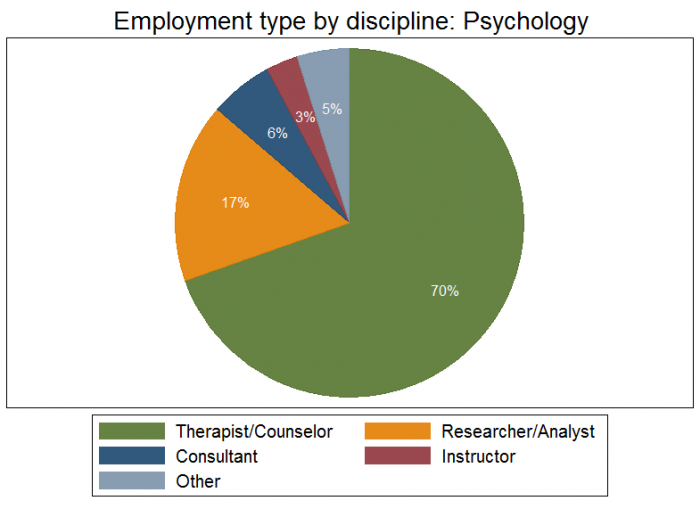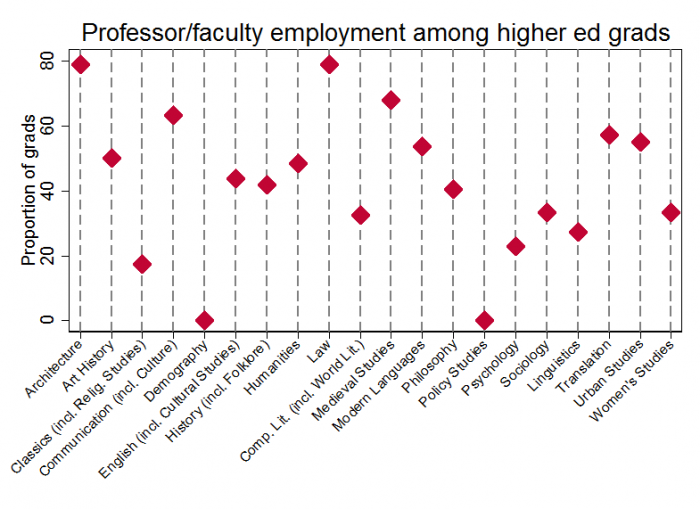Last time, we noticed that comparatively few Psychology grads in our sample are employed in higher education. As it turns out, these grads have a unique trajectory: approximately 70% are employed outside of the higher education sector as therapists or counselors, as we illustrate below. Most of the grads categorized as instructors or researchers/analysts in this chart are employed in higher education, but this career path is not particularly common for Psychology PhDs in our sample.

Let’s turn back to our full sample (all departments). We recently showed that the proportion of grads working in higher education is relatively stable across disciplines, with a few exceptions (one of which was Psychology). As a reminder, our “higher education” category is a composite variable consisting of tenured/tenure-track professors, postdoctoral fellows, research fellows, administrators, and other contract positions. We decided to tease this category apart and look for trends in faculty/professor employment by discipline.
On average, approximately 42% of all grads working in higher education are employed as professors/faculty, but this proportion varies considerably from discipline to discipline in our sample. It’s important to remember that we have limited data on certain fields (Demography, Policy Studies, Women’s Studies), so the proportions corresponding to these disciplines may not be valid/reliable. Disregarding these cases, the plot below suggests that the proportion of grads working as professors/faculty is lower than average in some departments (Classics, Psychology), and higher than average in others (Architecture, Law, Medieval Studies). However, these apparent differences may be partially attributable to our sample size and/or inter-coder variability.

Of course, these trends only tell us part of a complex and nuanced story about where PhD grads end up post-completion. Next time, we’ll take a closer look at discipline-specific employment trends outside of higher education.
Last time, we noticed that comparatively few Psychology grads in our sample are employed in higher education. As it turns out, these grads have a unique trajectory: approximately 70% are employed outside of the higher education sector as therapists or counselors, as we illustrate below. Most of the grads categorized as instructors or researchers/analysts in this chart are employed in higher education, but this career path is not particularly common for Psychology PhDs in our sample.

Let’s turn back to our full sample (all departments). We recently showed that the proportion of grads working in higher education is relatively stable across disciplines, with a few exceptions (one of which was Psychology). As a reminder, our “higher education” category is a composite variable consisting of tenured/tenure-track professors, postdoctoral fellows, research fellows, administrators, and other contract positions. We decided to tease this category apart and look for trends in faculty/professor employment by discipline.
On average, approximately 42% of all grads working in higher education are employed as professors/faculty, but this proportion varies considerably from discipline to discipline in our sample. It’s important to remember that we have limited data on certain fields (Demography, Policy Studies, Women’s Studies), so the proportions corresponding to these disciplines may not be valid/reliable. Disregarding these cases, the plot below suggests that the proportion of grads working as professors/faculty is lower than average in some departments (Classics, Psychology), and higher than average in others (Architecture, Law, Medieval Studies). However, these apparent differences may be partially attributable to our sample size and/or inter-coder variability.

Of course, these trends only tell us part of a complex and nuanced story about where PhD grads end up post-completion. Next time, we’ll take a closer look at discipline-specific employment trends outside of higher education.
Discussion